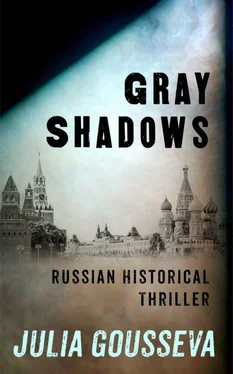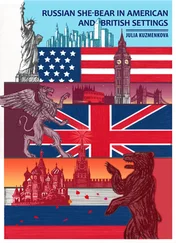Natalya smiled coyly. “Must be true love. I hope she feels the same.”
“I hope she does. But Moscow can be exciting, you know,” Nikolai said. “Of course, excitement is about people, not places. Even small towns have plenty of exciting people.”
“Just don’t think I’m interested in you,” Natalya said. “Now that I know you better, I see why Olga is losing interest in you and looking for excitement elsewhere.”
“And why is that?” Nikolai asked.
“You’re too safe, too reliable, too predictable. No sense of adventure, no spontaneity. And what girl wants that? We like excitement. Like you said, excitement is about people.”
“I see. I’ll have to think about it.” Something seemed strange about Natalya. He could not figure out why she kept bringing up Olga. Jealousy? But Natalya did not seem interested in Nikolai, and she probably knew she was too young for him. Her comments seemed purposeful, but Nikolai did not know what that purpose was. He had always thought he could read people pretty well, but this wasn’t the case with Natalya. At least not yet.
Pyotr Alekseevich came up to them. “Thank you again, Natalya. With a different interpreter, we would be here for another hour or more. You did a great job.”
“Would you like me to finish those written translations now?” Natalya asked.
“Yes, please,” Pyotr Alekseevich said. “On second thought, no. The translations can wait. Why don’t you come with me to look at the pipeline progress. There’s nothing there to translate, but it will be a nice break from the office. You’ll get to go outside the compound and see the real north. And the real oil field.”
Outside, Pyotr Alekseevich led them to a company-owned Land Rover parked in front of the building. He sat down in the driver’s seat.
“Do you often drive yourself?” Nikolai asked Pyotr Alekseevich.
“Most of the time. I like driving, especially in this rugged open space.”
Pyotr Alekseevich steered the Land Rover out of the gates, waved to Vanya through the window, and headed up the same main thoroughfare that connected the airport to Luzinsk. They headed away from the airport, further north.
“This might be your last chance to see the oil field since we’re getting to the end of the driving season,” Pyotr Alekseevich said.
“What do you mean?” Natalya said.
“These are not permanent roads,” Pyotr Alekseevich said. “You can’t build a permanent road here. It’s too swampy, so all these roads out to the oil fields are made out of tightly packed snow and can be used only in the winter. In the summer, the snow and the roads melt away, so we have to plan all construction accordingly. It’s impossible to transport materials by land vehicles once the snow starts melting. The whole area turns into one giant mosquito-infested swamp. Luckily, the winters are long.”
“But what supports the oil derricks in the summer?” Nikolai asked. “How do they not sink into the swamps?”
“We put them on large concrete pads that distribute the weight evenly and allow the derricks to remain in place. But when something needs repairs in the summer, it’s a real challenge to get to these areas. Most of the time, we have to use helicopters. And that’s expensive. Really expensive.”
The Land Rover passed a plain-looking weathered sign on the side of the road. For a moment, Nikolai wondered about the need for a traffic sign in this emptiness. As they came closer, he glanced at it. It said simply, the Arctic Circle.
“We’re almost at the main oil field,” Pyotr Alekseevich said as the road curved around a large snowdrift, and the Land Rover entered a vast open space. The thin bright line on the horizon was fading, and the only light came from the bright glow of the large full moon on the cloudless sky. The snow-covered expanse around them shimmered in the light. The land looked pristine and isolated.
“It’s like a different universe,” Natalya said.
“It is a different universe,” Pyotr Alekseevich said. “I like coming out here. It’s truly a no man’s land. Civilization is barely reaching here. No cell towers and no communications here besides two-way radios. But keep your eyes open.”
He slowed down and steered the Land Rover around a large hill. As soon as they cleared the corner, bright orange flares of burning oil and black iron lattice towers of oil derricks came into view, an industrial intrusion into the Arctic wilderness. Nikolai could see workers, dressed in parkas and wearing protective helmets, move around the derricks.
Pyotr Alekseevich kept driving until the industrial structures disappeared from view. He pulled over next to a concrete pad largely obscured by a thick layer of snow, turned off the engine but left the high beams on.
“Ready to see the pipeline?” he asked.
“Sure,” Natalya said and came out of the car. Nikolai followed.
A pipeline of about half a meter in diameter came out of the ground and zigzagged through the white snow-covered hills, its weight supported by heavy metal poles on both sides. The poles were placed every few meters along the pipeline.
“Our pride and joy,” Pyotr Alekseevich said. “It’s the new pipeline. No more leaks or spills into the rivers and onto the land.”
“Were there leaks before?” Nikolai asked.
Pyotr Alekseevich nodded. “Major ones, and nobody cared. Environmental protection laws are pretty lax, and the previous management did not care about pollution. Things got really bad. You could throw a lit match into the river, and it would catch on fire.”
“The whole river?” Natalya asked.
“The spilled oil created a film on the surface, and that’s what burned, but it looked like the whole river was on fire. It was hell on earth, but Moscow managers did not care much. As long as the profit was there, they considered it a successful operation. It’s different for me. I grew up here, I know and love this land. I go fishing in the summer, skiing in the winter. This is my home, and I want to keep it clean.” Pyotr Alekseevich paused and drew in a long breath. “We still have a few more smaller pipes to replace that are getting corroded, but this one was the worst.”
“Where does this pipeline go?” Natalya asked.
“From the oil field to the terminal in Upper Luzinsk and then on to the refineries down south.” Pyotr Alekseevich took one more look at the pipeline. “Shall we?” He motioned to the car.
“That’s all you needed to do here?” Natalya asked. “Look at the pipeline?”
“I just needed a break from the office. Coming out here helps clear my mind and focus on what’s important. But we should get back. I need to read over the bids again for the new environmental consulting company. Our environmental impact numbers should be much better this year, thanks to this pipeline.”
With a few hours left in the workday, Natalya and Pyotr Alekseevich headed back to the office, and Nikolai went to talk to Vanya about the latest security improvements. Nikolai was getting used to the short distances and tall snowdrifts. There was a strange sense of freedom in not having to wait for cars, buses, or spend any time in transit. He could get anywhere he needed in a matter of minutes, and the street lights pointed his way in the permanent semi-darkness of the Arctic winter. An added benefit was that his leg was feeling better and better, probably partially due to all the walking he was doing. Nikolai was sure he would remember this assignment and this town for a long time. It was so different from anything he had experienced or could have even imagined.
When the two young guards in the security office saw Nikolai, they jumped up from their lunch of salami sandwiches and pickles and tried to look busy. They were obviously relieved when Nikolai made no comments about their activities.
Читать дальше












